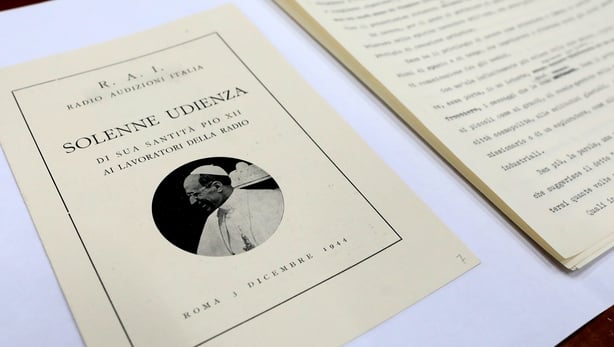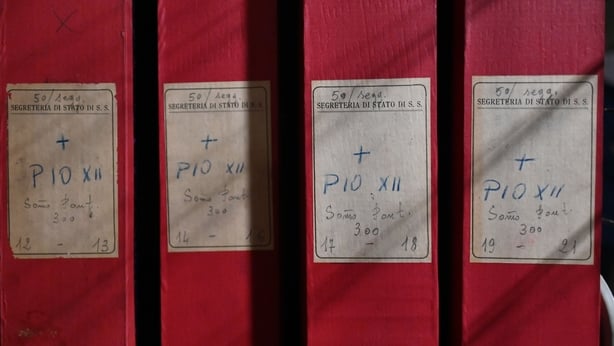As the Vatican unseals its secret archive on Pope Pius XII, to some he was seen as 'Hitler's Pope' who did little to stop or even condemn the slaughter of Jews during World War II. However, his proponents say the pontiff was in fact responsible for saving Jews.
Indeed it is well known that Pope Pius XII received letters after the war from Jewish leaders and individuals, whose lives were saved by the charitable deeds of churches, convents and monasteries.
The pontiff headed the Catholic Church from 1939 until his death in 1958.
Key questions to be answered include whether or not Pope Pius, formerly Cardinal Eugenio Pacelli, gave specific orders to save Jews, or just generic instructions to save all people in need.
No documents have ever been found to prove the theory that Pius XII issued orders to save European Jews from genocide.
In Italy, the Vatican and the Catholic Church did not protest against racial laws instated in 1938 against Italian Jews, but limited themselves to requesting mercy for Jewish converts to Catholicism or those who were married to Roman Catholics.
The Vatican first published the essentials covering the Holocaust four decades ago, an 11-volume work compiled by four Jesuits priests.
But some crucial pieces are still missing, such as the pope's replies to notes and letters - including those about the Nazi campaign of horror.

But the Vatican has warned that the documents in the archive will not smear Pope Pius XII.
"I don't think you will find a smoking gun," Father Norbert Hofmann, the top Vatican official in charge of religious relations with Jews, said.
When Pope Francis announced the opening of the archives last year, he said the church was "not afraid of history", a theme repeated last week at a presentation for reporters by Vatican archivists.
Bishop Sergio Pagano, prefect of the Vatican's Apostolic Archives, said documents from the World War II period contain millions of pages divided into 121 sections divided by topics.
The consulting area in the archive offices can accommodate 60 scholars at a time and all the space has been booked for the rest of the year, Bishop Pagano said. The scholars include some from the Holocaust Memorial Museum in Washington DC.
"We will not pass judgement for now. We will leave that to scholars. The material is there. It is diversified," Bishop Pagano said.
"We will leave each person to draw their own conclusions but we have no fear. The good (that Pius did) was so great that it will dwarf the few shadows," he said.
"For millions of people, Catholic and Jewish, these archives are of enormous humanitarian interest," Suzanne Brown-Fleming, international programmes director at the US Holocaust Memorial Museum in Washington, said.
The unsealed archives additionally cover a post-World War II era in which writers were censored and some priests hounded for suspected communist sympathies.

Assistant Professor from the Department of History at Trinity College Dublin, Patrick Houlihan is in the Vatican for a first look at the archive, and described it as a huge opportunity to be able to examine documents not only from the period of World War II, but also the early years of the Cold War.
Dr Houlihan said that in some ways, the question of Pope Pius' actions during the war is more a moral one, but it will be fascinating to see if it is possible to ascertain what the pontiff knew about the Holocaust.
We need your consent to load this rte-player contentWe use rte-player to manage extra content that can set cookies on your device and collect data about your activity. Please review their details and accept them to load the content.Manage Preferences
Kept confined to the Vatican during the war by the Nazis and then Italian Fascists, Pius XII was a German-speaking Italian aristocrat who witnessed Hitler's rise while posted as the Holy See's ambassador in Germany for 12 years.
"Keep in mind that Pius was very attuned to the German context in particular since 1917... he was Papal Nuncio to Bavaria...then he was [also] Secretary of State under Pius XI to Nazi Germany."
The archives will give historians a chance to better understand Pius XII's reticence about the Holocaust, which some view as unforgivable.
Others note that the church still saved around 4,000 Jews from certain death by hiding them in its Roman institutions - and that he had to stay neutral to better shield Catholics from the unfolding devastation.
Will these documents finally settle the debate? The historians are less than certain it will.
Pius XII "never raised his voice and I doubt that these documents will contradict this," said Italian historian Anna Foa, characterising his style as "very diplomatic and traditional".
"During the war, he thought his duty was to save lives but not to condemn ideologies," said Ms Foa.
"Pius XII was a product of his time. He was not particularly anti-Jewish, but he refused to disavow the anti-Jewish history of the church," she added.
Additional reporting: Reuters, AFP







